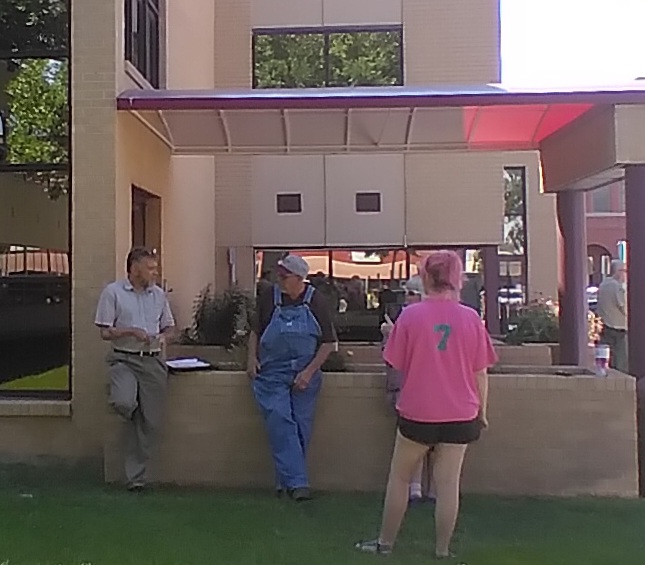9/3/2021 Crowley/Otero COVID-19 Update #1: 9/2/2021 Protest

Description: Otero County Health Department Director Rick Ritter Addresses Questions from Protesters Thursday Afternoon in La Junta.

9/2/2021 Protest: Yesterday (Thursday, 9/2/2021) I had a new experience, I was at a government protest. Never been to one of those before. And to make it even more interesting, the protest was about me, the Otero County Health Department (OCHD), and the Colorado Department of Public Health and Environment (CDPHE), regarding the COVID-19 vaccines, masks, Ivermectin COVID-19 treatments, and government authority overreach. To be sure, there was a lot more said on other topics, but the previously mentioned ones, as I recall, were the main, common themes of the protest, and are directly applicable to OCHD and CDPHE. The protest took place on the North side of the Otero County Courthouse and began shortly after 2:00pm.
My personal motive for being there was very clear and simple: I was there to listen in a respectful and kind manner to their protest, their concerns, worries, observations, and beliefs.
I did not take a count of the group, but based on memory I would estimate (notice my deliberate use of the word “estimate”) that the protest group was comprised of 9-11 adults and 3 children. With the notable exceptions of an individual who uttered some profanities (his comments made it clear he was not affiliated with the protesters nor with what they were protesting, and so I did not include him in the count estimate), and a protester that directed an offensive comment at me, the protesters were very respectful and their demeanor was commendable. I appreciate that very much, thank you.
It was video recorded, and I’m sure you can find it on Facebook, check it out.
At the beginning, I told the protesters that for me to continue to stay and listen to them, they would have to agree to some courtesy protocol. The protocol was simply to keep me present and listening, and was not a condition for the protest itself. I was absolutely under no obligation to be present, and I could have left at any time. I have attached a copy of what I read to the group at the beginning of the protest.
I wrote down the questions that I thought may not be explicitly answered in my community updates. After having time to give sufficient thought and reflection to the questions posed, and following my protocol of replying in writing, here are the questions and my responses:
a. What is the difference between a law and a mandate?: Laws are found in Colorado Revised Statutes (CRS). The CRS are a compilation of the state laws of Colorado that are drafted and ratified by the General Assembly (state senators and representatives, the legislative, or lawmaking, branch of our state government) and signed officially into law by the governor. Here is where you can find CRS online: Colorado Legal Resources (lexis.com) Examples of public health CRS laws pertinent to our COVID-19 situation are found directly below. For purposes of context, these are the Local Public Health Agency (LPHA) statutes/laws. The Otero County Health Department (OCHD) is an LPHA. CDPHE has similar laws likewise found in Title 25 of CRS. Now, here are specific examples of local public health laws as they pertain to disease control:
You will notice that those laws made general comments about controlling disease, controlling people and property, and closing public places. But these laws did not provide the details on how to specifically go about these actions. That is because separate public health incidents are unique and riddled with nuances. In my career, I have been through 3 significant disease outbreaks (West Nile Virus, H1N1, and COVID), I applied the same general law to control disease as found in the above mentioned statutes, but the specific way I operationalized each event was different in many ways. This is where the mandate/order comes in. Mandates/orders are intended to be custom made to address the unique event. The LPHA public health law found at CRS 25-1-509(1)(c) gives the LPHA emergency authority to “issue orders (or mandates) and adopt rules consistent with the laws and rules of the state…” So, based upon the foregoing detail, here is how we connect the dots all the way from the U.S. Constitution to a local public health mandate/order:
And, by the way, I had our agency attorney, Mr. Nathan Shultz, review the above material before I sent it to you.
b. In the absence of a state mask mandate, would OCHD impose a local mask mandate?: First, a careful review of the data (i.e. epi curve, case rates, presence/absence of strong epi links, potential/established widespread community transmission, etc.) would be done, accompanied by concurrent consultations with OCHD and CDPHE public health professionals. If the result of these efforts clearly dictated the public health need for a local mask mandate, then yes, OCHD would unhesitatingly mandate masks in the absence of a state Public Health Order (PHO).
c. If masks are mandated in schools, will they be mandated elsewhere? And if not, why not?: Short answer: Not necessarily because it might be a situation specific occurrence. Explanatory details: As with public health law (see above), epidemiology and disease control are highly complex with a ton of moving parts. Our disease control interventions are driven by data (i.e. incidence rates, epi curves, etc.) and, when necessary, appropriately recommended or mandated Non-Pharmaceutical Intervention, or NPIs (i.e. masks, social distancing, closures, isolation, quarantine). Another very important factor we look at and consider involves attempting to determine if the cases are linked to a specific family and/or a group of close friends (people who normally have close contact), to a specific building (such as a school, office, etc.) or we might find that we cannot make many of those epi links at all, which might lead us to conclude that we are experiencing widespread, community transmission. If we find that the cases are generally limited to a specific site, then universal masking is more than likely not necessary, it might just be at that site, and for a limited amount of time. If we are experiencing widespread, community transmission, universal masking might be mandated to combat the surge in cases to prevent further transmission, sickness, death, and to keep our hospital’s critical care capacity viable.
d. If masks are mandated, how would you track and enforce compliance?: As with public health throughout this state and nation, OCHD is facing a worker shortage. We do not have the staff capacity to actively patrol our 2 county jurisdiction to look for noncompliance. So, we will “track” noncompliance through incoming complaints. When appropriate, we would follow the legal process that I detailed in the September 2nd, 2021 update. I have copied the pertinent information from that update here (and also attached that original email): “So, how are things going to play out if (notice my deliberate use of the word “if”) OCHD has to issue local PHOs and enforce them. Consider the following illustration (this is just an illustration, and if there is someone out there named “John Doe”, I am absolutely NOT referencing you). So here goes the illustration: Based upon the most available, current data, OCHD issues a local PHO. John Doe does not agree with it (for whatever reason), and refuses to comply. OCHD receives a complaint regarding John Doe’s noncompliance (and we absolutely will). Pursuant to CRS 25-1-506, OCHD investigates the matter. After investigation, OCHD confirms the complaint as true. OCHD issues a Notice of Violation/Notice to Comply to John Doe. After the issuance of the Notice, follow-up OCHD investigation finds that John Doe continues with noncompliance. At this point, and pursuant to CRS Title 25, Article 1, and Part 5 (specifically CRS 25-1-506, 509, 514, 515, and 516) OCHD turns the matter over to our agency attorney for a legal remedy through the courts, and we let a judge decide the matter. This is the established legal process for public health law enforcement, this is the process I have followed in the past, and this is the process I will continue to follow for COVID-19.”
e. Shutting down businesses?: At this point in time, there is absolutely no reason (based upon currently available data and evidence) to even consider an across the board shutting down of businesses as was done in the pre-vaccine surge of many months ago. We have effective vaccines readily and freely available, vaccinations are continuing to build herd immunity, and we are not experiencing a widespread, community transmission event that even remotely resembles the case surge that culminated with peak cases in December 2020.
As I mentioned before, I respectfully listened and heard what was said yesterday (contrary to the opinion of one protester). I thought about and reflected on your comments, concerns, objections, etc. However, respectfully listening and hearing does not put me under any obligation to agree. I am still firm in my professional beliefs that:
1. The COVID-19 vaccine is effective and poses very, very little risk of a negative post-vaccination adverse outcome (For more information on this, see this website on Vaccine Adverse Event Reaction, or VAERS: Vaccine Adverse Event Reporting System (VAERS) (hhs.gov));
2. Masks reduce the risk of exposure to COVID-19 and do a much, much better job than “a chain link fence does in keeping out mosquitoes”;
3. The using of veterinarian medications that have not been approved by the FDA for use in humans (i.e. Ivermectin) is extremely ill-advised; &
4. Both state and local public health mandates/orders are not an overreach of government power and are absolutely legal, legitimate, and valid as long as the following important epidemiological and legal conditions are met:
ü Data and evidence support the mandate;
ü Due process (guaranteed under the Fourteenth Amendment to the United States Constitution) is considered and ensured;
ü The legal concept of Least Restrictive is considered and ensured; &
ü There is no evidence of the findings listed at CRS 25-1-515;
With a couple of exceptions, I thank you for keeping your language clean, inoffensive, and respectful (especially because there were little kids there), and for protesting in a peaceful manner. Our ability to voice our opinions, openly dialogue, and disagree with our government and others is at the very core of our Democracy, and codified for us in the First Amendment to the United States Constitution. As I mentioned to a respectful protester yesterday, “I may not agree with what you say, but I will defend your right to say it.”
And finally, a BIG thank you to our friends in law enforcement for being there just in case!
Richard Ritter, Executive Director
Otero County Health Department
13 West 3rd Street, Room 111
La Junta, Colorado 81050
719-383-3045 (Office)
719-383-3060 (Fax)
Follow SECO News on Facebook.
Subscribe to the SECO News YouTube Channel.
Press releases Sponsor

Healthcare Sponsor




.png)


.png)




.png)



.png)


.png)







